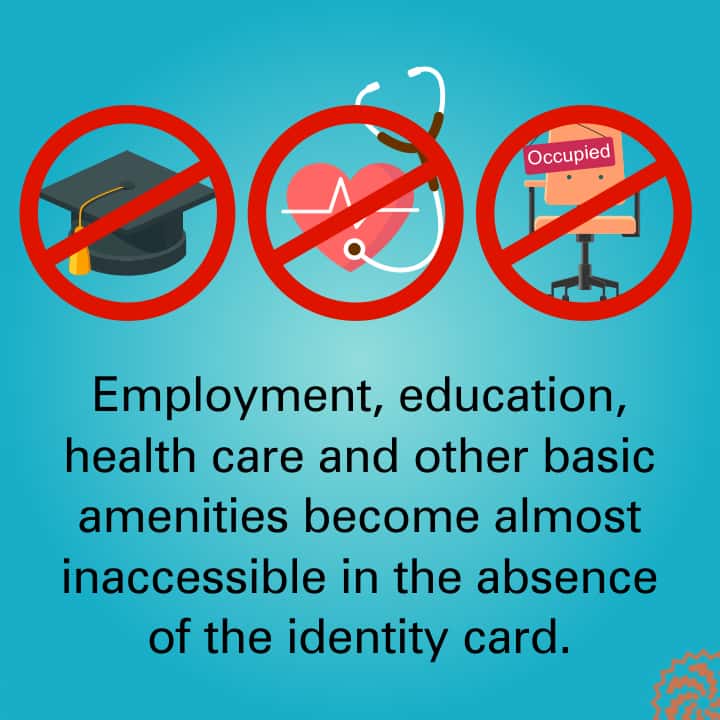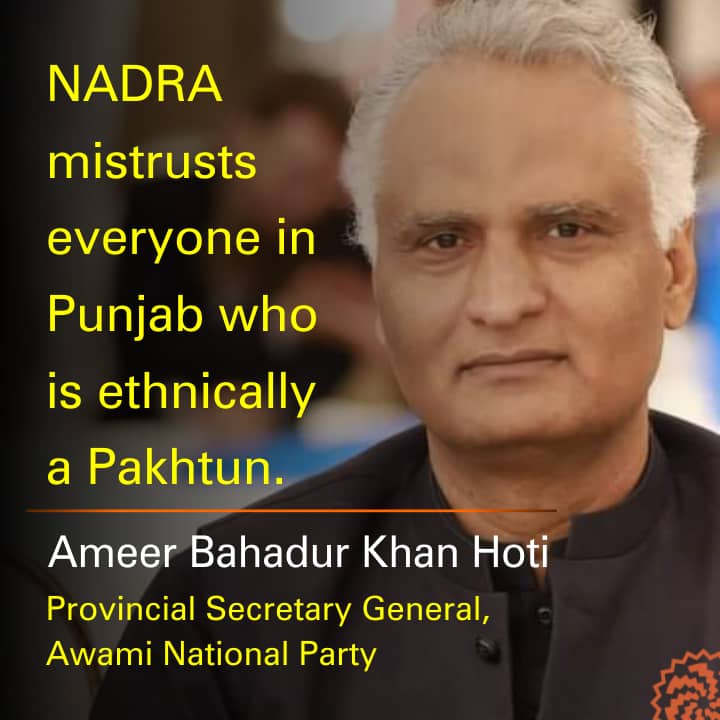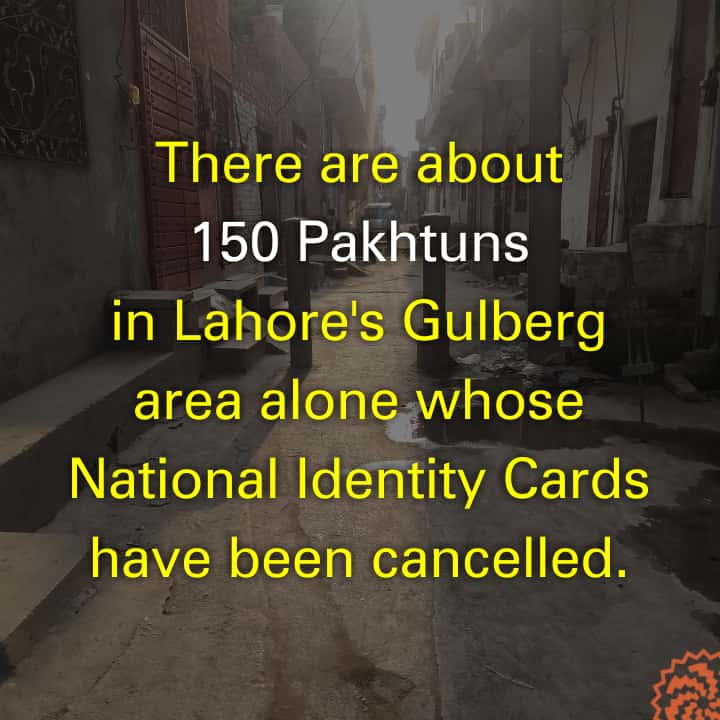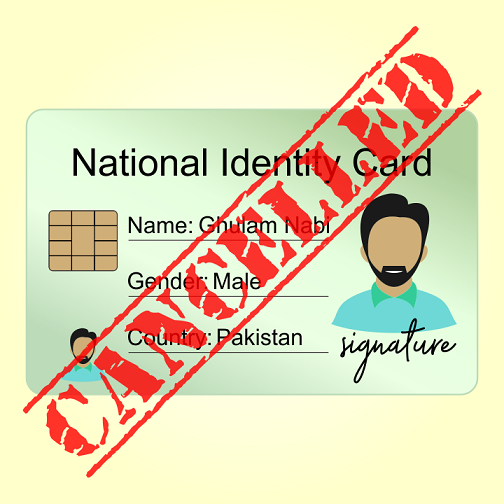Ghulam Nabi Khan, a tall man sporting a grey beard, has been visiting different government offices for the last several years to get his computerized national identity card (CNIC) restored. All to no avail.
Khan, 65, shifted his family to Lahore 22 years ago from his hometown in Manshera, a north-eastern district of the Khyber Pakhtunkhwa province. He presently lives in a small rented house in Shahdara, a residential area in northern Lahore.
His ordeal began on 20th July, 2009 when he received a letter from the regional headquarters of the National Database and Registration Authority (NADRA) in Lahore. The letter disclosed that his identity card stood blocked because a foreigner, claiming to be his son, had tried to get himself registered as a Pakistani. NADRA also accused him of fraudulently obtaining his own CNIC back in 2002.
In his written reply to the letter, Khan told NADRA that the foreigner claiming to be his son might be doing this mistakenly or it could be a deliberate attempt to put him in trouble. To prove himself a legal Pakistani citizen, he attached with his reply the photocopies of his birth certificate, his father’s death certificate and some other documents duly attested by the member of the National Assembly from his area.

With a slurred speech caused by a stroke he suffered around five years ago, he says he also showed NADRA his manually-made national identity card that was issued on October 17, 1994 — showing him a resident of Yusuf Goth in Karachi — and a valid passport which he had used for travelling to Saudi Arabia to perform Umrah several years ago. “But all this evidence notwithstanding, my identity card was not restored.”
In 2015, Khan petitioned the Lahore High Court (LHC), seeking the restoration of his CNIC. The case is still pending before the court despite the lapse of six years.
Some people, pretending to be NADRA agents, meanwhile approached him, offering that they could get his identity card restored if he could pay them 40,000 rupees. He gave them the money. When, however, they did not show him any results, he knew he had become the victim of a fraud. He, though, managed to get his money back from them by involving his influential acquaintances in the matter.
Problems aplenty
Fazal Kareem, 32, who also originally hails from Mansehra, works as a teacher in a private school in Shahdara.
Six years ago, he, too, moved LHC to get his identity card restored. As a result, some people identifying themselves to be the personnel of police department’s special branch started visiting his residence. They, Kareem alleges, would make him pay 6,000 rupees to 7,000 rupees during every visit, applying various harassment tactics.
Now he fears that his blocked CNIC may cost him his job.
His school’s administration has recently asked him to get himself vaccinated against Covid-19. Otherwise, he is told, he would not be allowed to continue his job. But he cannot get the vaccine shots without possessing a valid CNIC.

Before joining this school job, he used to study a Jamia Nizamiya, a seminary in Lohari Gate area but he could not graduate from that madrassa because a valid CNIC was mandatory to appear in examinations there.
Apart from these obvious problems, he is also facing a number of other difficulties due to his blocked CNIC. For instance, in the event of any illness, he cannot avail the facility of hospitalization at any government-run healthcare facility. Similarly, he is not entitled to receive free medicines from government hospitals.
He has also not benefited from the Ehsas Emergency Cash scheme launched in April last year to provide financial assistance to the people facing economic hardships due to the Covid-19 pandemic. Likewise, he is not issued bus ticket for inter-city journeys. Even if he somehow manages to get the ticket by using somebody else’s CNIC, he travels under the constant fear that the police might ask him to prove his identity by showing his CNIC which he does not have.
“Despite the fact that I am a Pakistani citizen, I’m forced to live the life of an absconder,” he says.
Ghulam Nabi Khan is also faced with almost the same issues.
None of his eight children -- five sons and three daughters -- could either get admission to a high school (because submitting a NADRA-issued Form-B is mandatory for that) nor could they get government jobs. All his sons make naan (traditional bread) near their house.
Ethnic profiling?
Like Khan and Kareem, the CNICs of hundreds of Pakhtuns living in different areas of Lahore are blocked. NADRA’s own record shows that the cards of around 150 Pakhtuns are blocked just in Khan Colony neighbourhood in Gulberga area.
The Lahore chapters of Pakhtun nationalist parties see ethnic profiling as the reason for this CNIC blockade. Ameer Bahadur Khan Hoti, general secretary of the Awami National Party (ANP) in the city, alleges that NADRA looks suspiciously at every Pakistani of Pakhtun origin. If that is not the case, he asks, then why only the identity cards of Pakhtuns are blocked in Lahore.
Also Read

Pakhtuns of Lahore: 'We have been deliberately undercounted in the census.'
A senior leader of the Pakistan People’s Party, Farhatullah Babar, has something similar to say.
In 2018, he says, NADRA blocked the identity cards of hundreds of Lahore-based Pakhtuns but later a number of these cards were restored. This, he says, happened because NADRA could not produce sufficient evidence required to keep them blocked.
The problem of CNIC blocking, according to him, is intertwined with the issue of Afghan refugees in Pakistan. The Pakistani government, he laments, has never devised a clear policy or law to determine the status of these refugees. They are rather used as a shuttlecock, depending on the constantly-changing diplomatic ties between the two neighbouring countries, he says.
Babar explains this by saying that, on the one hand, people of foreign origin, mainly Afghans, are found to be possessing Pakistani identity cards but, on the other hand, the cards of known Pakistani Pakhtuns are being blocked, declaring them non-Pakistanis.
He has at least two high-profile cases to cite for substantiating his argument.
The first one is that of a Pakhtun Senator from Balochistan, Hafiz Hamdullah, whose identity card was blocked after NADRA declared him a non-Pakistani in October 2019. In May 2021, however, the Islamabad High Court ordered NADRA to restore his CNIC.

The same month, NADRA blocked the identity card of another Pakhtun parliamentarian, Mohsin Dawar. He is a member of the National Assembly from North Waziristan, a tribal district of Khyber Pakhtunkhwa bordering Afghanistan, and a founding member of a Pakhtun nationalist outfit called Pashtun Tahaffuz Movement.
Reacting to the blockade of his CNIC some weeks later, Dawar expressed his anguish through a tweet: “For the last two months, my CNIC has been blocked & my bank accounts were frozen. All of this because I speak for the respect and sanctity of the constitution…”
Syed Bilal, a NADRA spokesman at its regional headquarters in Lahore, however, refutes the accusations that identity cards are being blocked on the basis of any ethnic bias. According to him, CNICs of only those people are blocked who are found to have received them by using unfair means.
It is essential for blocking an identity card to establish that the person in question has been involved in some anti-state activity or his/her claim to be a Pakistani national is not genuine, he explains. “But before doing so, the person concerned is served with a notice and is also informed through a newspaper advertisement, providing him with an opportunity to submit evidence to prove himself a Pakistani citizen.”
But evidence belies this official clarifications.
A Lahore-based lawyer, Usama Khawar, says he is pleading before local courts in many cases of what he calls “unjustifiably” blocked identity cards of Pakhtuns.
This, anyway, is an unlawful act, he argues, because Islamabad High Court Chief Justice Athar Minallah has categorically ruled in Hamdullah’s case that depriving someone of citizenship rights is subject to the prior approval of the parliament and the federal cabinet. NADRA cannot do it on its own, he says.
Published on 6 Oct 2021



















